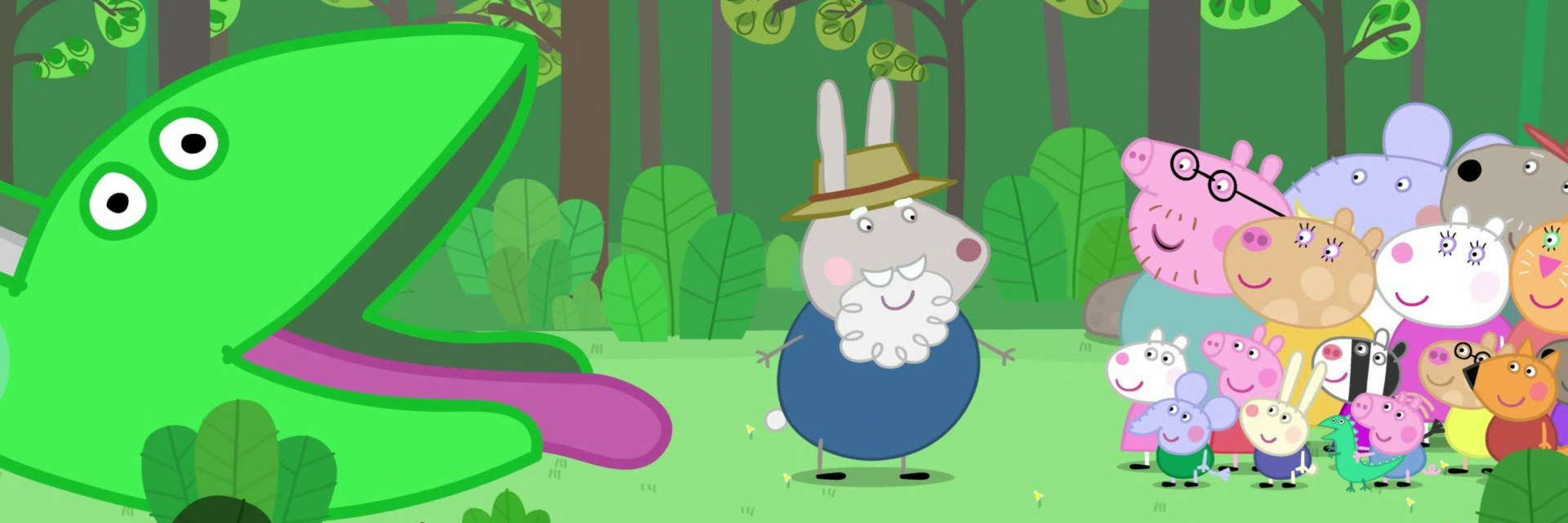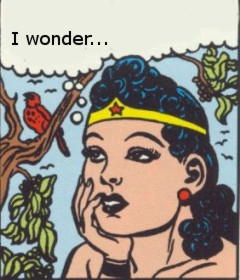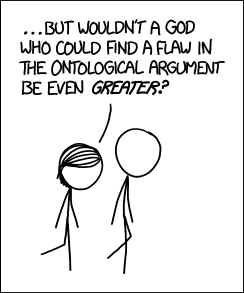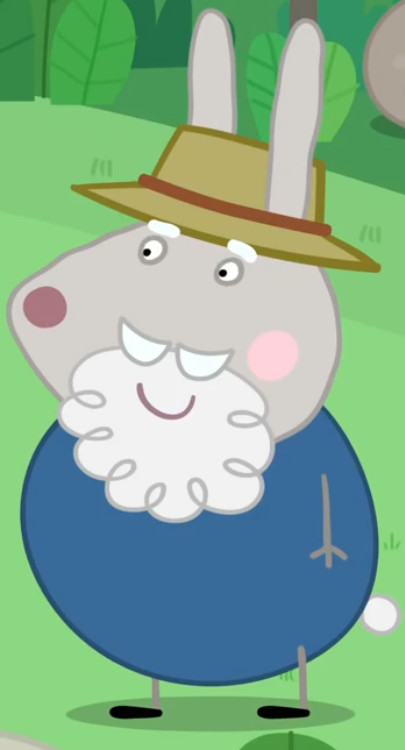
Peppa Pig & the Ontological Argument
There are many things one could say about Peppa Pig, but here’s something you mightn’t have heard before: it makes some fascinating philosophical claims. I am merely a tourist in the land of Peppa Pig, having watched a handful of episodes with a young enthusiast, so by all means get in touch with your own favourite thought-provoking episode (on Twitter, Facebook or via the comments below).
One that has stuck with me for many years is Season 4 Episode 16: Grampy Rabbit’s Dinosaur Park (which scores a tragically low 5.4/10 on IMDB).[1] The synopsis reads:
To celebrate Freddy Fox’s birthday the children go on a trip to a Dinosaur park where they follow dinosaur footprints to find Freddy’s birthday treat.
This does not do it justice.
At the opening of the episode the cast of characters arrive at Grampy Rabbit’s dinosaur safari park and Peppa asks the first instance of a question which recurs throughout the episode:
Peppa Pig: Are there really dinosaurs here?
Grampy Rabbit: No, just pretend ones.
Peppa Pig: Phew.
Following this a small elephant pipes up about the demise of the dinosaurs millions of years previously and the narrator dismisses him as a “clever clogs”. Fear not, lovely reader - we shall not be so easily deterred by this blatant anti-intellectualism.

As the children and parents move through the dinosaur park, Daddy Pig notes that the dinosaur footsteps they’re following look very real, and double-checks that there are no living dinosaurs in the park. Grampy Rabbit assures him that there aren’t, and it soon transpires that the footprints lead to a gigantic dinosaur slide. Merriment ensues.

Finally, Grampy Rabbit announces that they are to find a dinosaur egg, and thanks to Freddy Fox’s keen sense of smell the task is swiftly completed. It is at this point that the episode’s most fascinating claim is made.
But before we get to spoilers, some groundwork needs to be laid. While Peppa Pig and friends are concerned with the reality of dinosaurs – at least the ones in Grampy Rabbit’s park – their discussion readily applies to much thornier philosophical debates.
Is it real?
Back in the 11th century, St Anselm was likewise concerned with matters of existence, albeit of God rather than dinosaurs. Anselm proposed what’s taken to be the first of a series of arguments known as ‘ontological’ arguments for God’s existence.[2] It can be found in Chapter 2 of his Prosologion,[3] and goes roughly[4] like this:
God is a being than which nothing greater can be conceived.
Conceived doesn’t mean quite the same thing as imagined in philosophical circles – there’s debate about how exactly to conceive of ‘conceiving’ – but we can treat them as roughly interchangeable for our purposes. So the greatest thing one could imagine is God. If you can conceive of something greater than God, you weren’t conceiving God correctly.
Things can exist in the understanding alone, or in reality as well.
Anselm uses the example of a painter planning what he will paint. The painting exists in the painter’s mind; once it is painted it will also exist in reality.
That than which nothing greater can be conceived must exist in reality, not merely in the understanding.
Anselm contends that if God were just imagined – i.e. existed only in our minds – then God wouldn’t be the greatest thing of which we could conceive. Something that we conceive of as existing in reality – i.e. something we conceive of as real – is greater than something we conceive of as merely imaginary.
To make this a little clearer: take Wonder Woman. What would be better, greater, more magnificent: a Wonder Woman who exists merely in comic books, or a Wonder Woman who exists as we do?

For Anselm, the answer is obvious: the real Wonder Woman is superior to the fictional one. If God is not just conceivably great but the greatest thing of which we could conceive, and existing in reality makes you greater than existing only in our minds, then God – i.e. the greatest thing of which we could conceive – must exist, otherwise God wouldn’t be the greatest thing of which we could conceive.
So, God must exist.
In Anselm’s words:
Therefore, if that than which nothing greater can be conceived exists in the understanding alone, the very being than which nothing greater can be conceived is one than which a greater being can be conceived. But obviously this is impossible. Hence there is no doubt that there exists a being than which nothing greater can be conceived and it exists both in the understanding and in reality.
Anselm, Prosologion
Back in the 11th century, St Anselm was likewise concerned with matters of existence, albeit of God rather than dinosaurs.
Following Anselm, big philosophical names produced their own ontological arguments: Descartes, Leibniz, Godel, Plantinga, among others. There have been various refutations of them; nowadays ontological arguments are generally not considered very persuasive. However, as Bertrand Russell notes:
The argument does not, to a modern mind, seem very convincing, but it is easier to feel convinced that it must be fallacious than it is to find out precisely where the fallacy lies.[5]

And this is where Peppa Pig reveals its philosophical insight. Anselm’s ontological argument relies on the idea that something that exists in reality is greater than that which exists only in our minds. In other words, that something real is better or greater than something not real or imaginary. Many previous critics have argued that existence isn’t the sort of thing that bears on greatness: strength might, or goodness, but existence is a different kind of thing to those. Peppa Pig, by contrast, strikes in more direct fashion.
When we left them, our cast of characters had come upon the sought-after dinosaur egg. Peppa asks,
“Is it real?”

Grampy Rabbit: It’s better than real. It’s pretend.
Footnotes
[1] You may be able to find the episode here: https://www.youtube.com/watch?v=DfMYw33jph0
[2] Ontology is a subset of metaphysics dealing with the nature of being. Ontological arguments of the kind mentioned above purport to derive God’s existence from reason and logic alone, rather than experience (that is, from premises that are a priori, necessary and analytic).
[3] Anselm, Prosologion, Chapter 2. http://www.uta.edu/philosophy/faculty/burgess-jackson/Anselm,%20Proslogion.pdf (Accessed September 2019).
[4] I say roughly for two reasons – firstly because this is a rather cursory reconstruction on my part, and secondly because a more formal reconstruction of Anselm’s argument is not as straightforward as it might at first seem. Cf. Eder, G. & Ramharter, E. Formal reconstructions of St. Anselm’s Ontological Argument”, Synthese (2015) 192: 2795. https://doi.org/10.1007/s11229-015-0682-8
[5] Bertrand Russell, History of Western Philosophy, (London: Routledge, 1961). Book 3 Part I Section XI p. 568. If you're interested in objections to the ontological argument, see Further Reading below.
References
- Anselm, Prosologion http://www.uta.edu/philosophy/faculty/burgess-jackson/Anselm,%20Proslogion.pdf. Accessed September 2019.
- Russell, Bertrand. History of Western Philosophy, London: Routledge, 1961.
Further reading
For more information on the ontological argument, these are a good place to start:
- Oppy, Graham, Ontological Arguments, The Stanford Encyclopedia of Philosophy (Spring 2019 Edition), Edward N. Zalta (ed.), https://plato.stanford.edu/archives/spr2019/entries/ontological-arguments/.
- Himma, Kenneth, Anselm: Ontological Arguments for God’s Existence”, Internet Encyclopedia of Philosophy, (ND). https://www.iep.utm.edu/ont-arg/
The Wikipedia page on Tarzan’s yell contains more information than you would ever need in order to recreate the distinctive sound (to which Grampy Rabbit plays homage in his descent on the slide): https://en.m.wikipedia.org/wiki/Tarzan_yell
Finally, if you want to continue your philosophical journey by way of further Peppa Pig episodes, might I suggest starting with S3 E17 – Mr Potato Comes to Town – which introduces children to the concept of cannibalism by way of this delicious (excuse the pun) exchange:
Mr Potato: “Eat fruit and vegetables.”
Peppa Pig: “Which ones should we eat, Mr Potato?”
Mr Potato: “Apples, oranges, carrots, tomatoes…”
Peppa Pig: “Potatoes?”
Mr Potato: “Ermmm…”
No comments
Start the conversation…